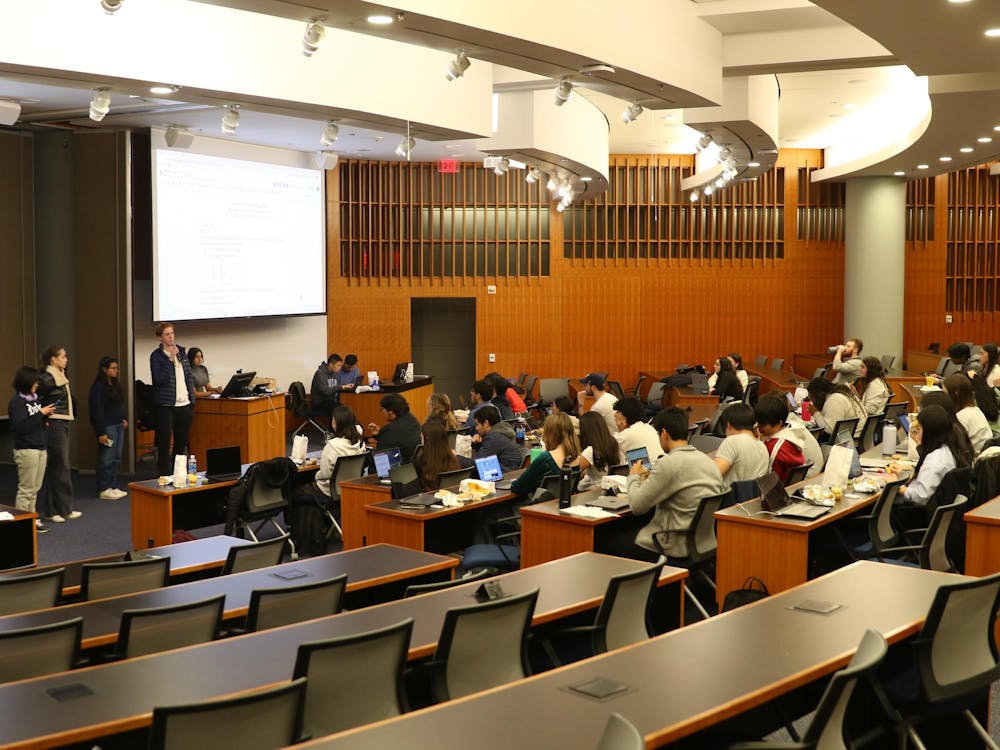Duke Student Government senators met Wednesday to discuss the potential rule changes to the upcoming spring DSG election season and deliver committee progress updates.
Planning for DSG elections
Senators heard a detailed timeline of the spring 2024 DSG election season, with campaigning and polling to take place throughout March for students running for executive president, executive vice president, committee vice president and senator positions.
DSG Attorney General Annie Cui, a senior, presented the Spring 2024 DSG Election Statute, which proposed removing the student group endorsement process.
Juwan Jacobs, DSG advisor and assistant director for student involvement and leadership, cited the rigid structure surrounding endorsements — such as the requirement for organizations to give each candidate equal speaking and questioning time — as a reason for eliminating the process.
Jacobs also detailed a shift in focus from student groups to individual students when marketing DSG elections, describing the endorsement process as “taking away the power from the students.”
Another notable change in the statute included the scheduling of presidential debates, which would give candidates the opportunity to discuss policy platforms and answer questions from the student body.
One senator raised the concern that endorsements are a helpful mechanism for spreading information about candidates, and that some students rely on the perspective of the leaders of their organizations.
Jacobs proposed a compromise by inviting student groups to send in endorsements following presidential debates. Polls are scheduled to open 17 hours after the conclusion of the suggested date for the presidential debate, although a second presidential debate was proposed to increase accessibility.
One senator argued that the changes raise the burden for student groups, requiring them to attend debates rather than having candidates meet with the organizations themselves. Jacobs responded by emphasizing the focus on individual students.
“I’m not asking student groups to show up to the debate,” Jacobs said. “I’m asking students to show up to the debate.”
The polling period, beginning at noon on March 27, was tentatively extended from 24 hours to 48 hours. Jacobs cited having one consolidated election, rather than two separate elections, as a reason for the extended polling period, in hopes of increasing student turnout.
Following these discussions, the senate unanimously voted to table the discussion until the following meeting, giving time for increased feedback from senators.
Committee progress updates
The campus life committee discussed the nightly traffic cone block preventing vehicles from turning onto Towerview Road from Duke University Road. In response to student safety concerns about nighttime Uber drop-offs in the area with “minimal lighting,” the committee met with John Dailey, the Duke University Police Department chief of police.
The committee and the police department discussed moving the traffic cones further down Towerview Road as a short-term solution. Meanwhile, the possibility of installing a gate with student-only access was discussed as a long-term solution.
The equity and outreach committee discussed a survey initiative with Duke LIFE, the lower-income, first-generation engagement office, on student satisfaction with its physical location in Perkins Library.
The space was previously criticized in a September New York Times Magazine article, which described entering the Duke LIFE space as a “public declaration of a student’s modest background.”
The committee also discussed continued work on a program proposed in the fall that would seek to include laundry fees as part of tuition to benefit low-income students.
In other business
DSG senators allocated $8,067.74 to the Black Women’s Union for a conference at Yale, $2,856 to Blue Devil Barbells for a competition in Atlanta, $16,460 to Duke Deewana for a competition in Los Angeles, $4,946.59 to the Duke Sports Analytics Club for a conference at MIT and $4,505 for three dance competitions.
DSG senators also approved programming funds, allocating $11,735 to Hoof ‘n’ Horn for its adaptation of “Natasha, Pierre & The Great Comet of 1812,” $1,640 to the Muslim Students Association for its speaker event with Olympic fencer Ibtihaj Muhammad, and $1,825 to Students for Justice in Palestine for their Palestine 101 speaker event featuring activist Ahmad Amireh.
The senators were also presented with a first reading of the DSG Election By-Law, which contains the rules and procedures for conducting DSG elections and inaugurations.
The senate discussed the six-member board of elections, which includes three DSG members and three non-DSG members. Seniors Shreya Joshi and Rashad Rahman and first-year Samanyu Gangappa were nominated for the three DSG member positions.
Get The Chronicle straight to your inbox
Signup for our weekly newsletter. Cancel at any time.

Michael Austin is a Trinity sophomore and managing editor of The Chronicle's 120th volume.

